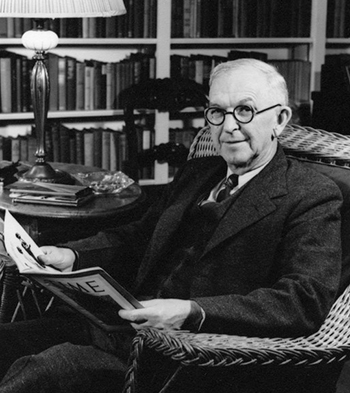28 Sept. 1880–13 Sept. 1971
See also North Carolina Crop Improvement Association

Ira Obed Schaub, educator and agricultural extension leader, was born at King in Stokes County. He was the fourth of five sons of William Henry and Mary Laura Grabs Schaub, Moravians whose forebears settled in Stokes (now Forsyth) County in 1756. His father was a farmer and miller. Ira Obed Schaub received his early education at Pinnacle Academy near his home and in 1896 enrolled at the North Carolina College of Agriculture and Mechanic Arts (North Carolina State University), where he received a B.S. degree in agriculture in 1900. After three years of graduate work in chemistry at Johns Hopkins University, he accepted a position as assistant chemist with the Illinois Agricultural Experiment Station. In January 1905 Schaub moved to Iowa State College to become an assistant professor of soils. He returned to North Carolina in March 1909 as an agronomist with the North Carolina Agricultural Experiment Station.
While Schaub was on the faculty at Iowa State, he met Maud Kennedy, the daughter of an Iowa farm family. They were married on 27 July 1910 and became the parents of two children, Maud Kennedy and Ira Obed, Jr.
In July 1909 the North Carolina College of Agriculture and Mechanic Arts became the first land-grant school in the nation to sign an agreement stating that the college would cooperate in the sponsorship of "Farmers' Boys Clubs." Schaub was appointed to lead the new program, which was the beginning of 4-H Club work in North Carolina. He left North Carolina in 1914 to take a position as superintendent of farm demonstration work with the Frisco Railroad. This was followed by six years as southern field (extension) agent for the U.S. Department of Agriculture. Schaub returned to North Carolina State College in 1924 to become the first full-time director of the Agricultural Extension Service, a post he held until his retirement in 1950. He also served as dean of the School of Agriculture from 1925 to 1945 and acting director of the Agricultural Experiment Station from 1937 to 1940.
Active during his retirement years, Schaub wrote histories of the Agricultural Extension Service and the Experiment Station and helped to organize records and materials for a university archives. He received a number of scholastic and professional honors during his lifetime, including an honorary doctorate from Clemson College in 1937. His alma mater, North Carolina State University, gave him an honorary doctorate in 1951 and named its new food science building for him in 1969.
Schaub remained in remarkably good health until about three years before his death, which occurred in Raleigh just two weeks before his ninety-first birthday. He was buried in the Mount Pleasant Methodist Church Cemetery at King.